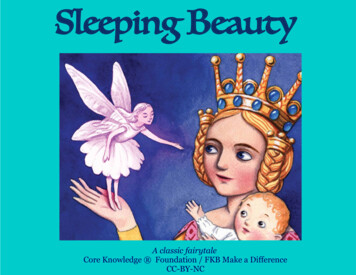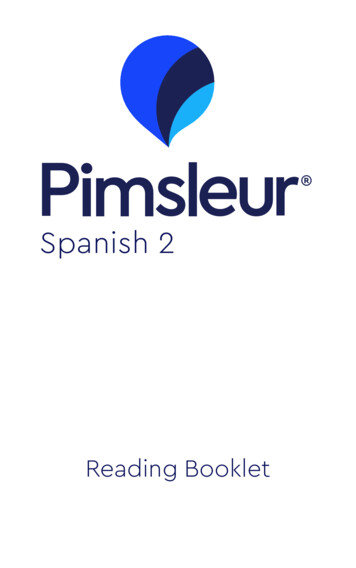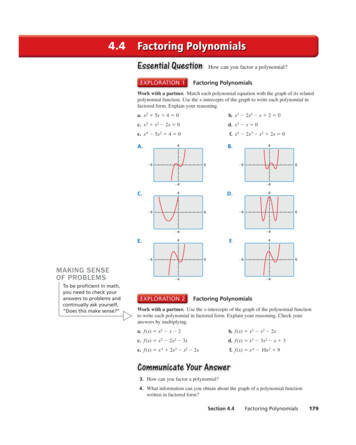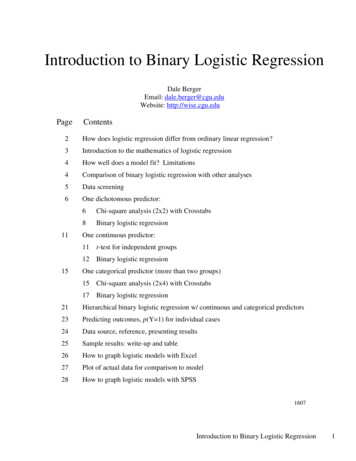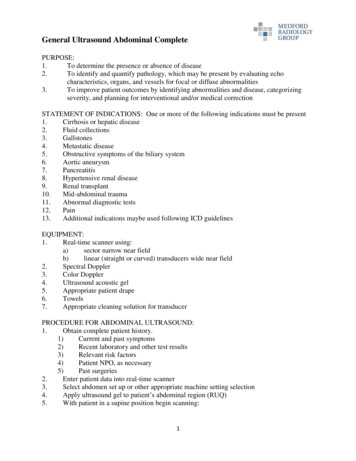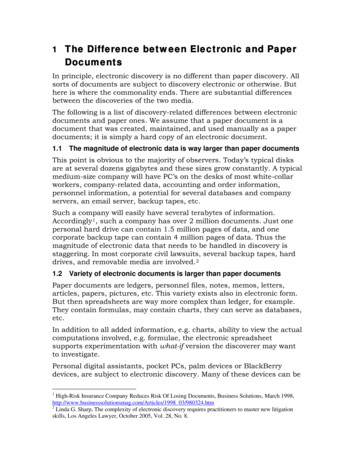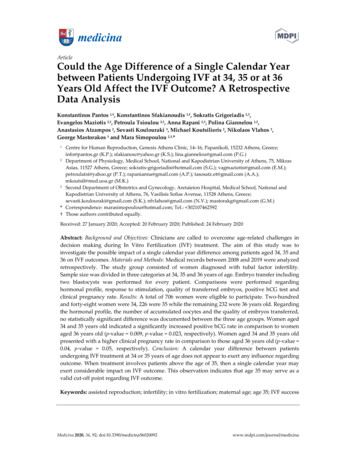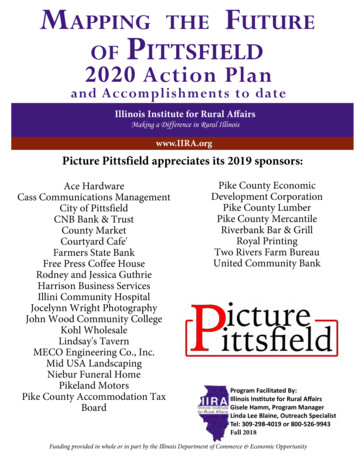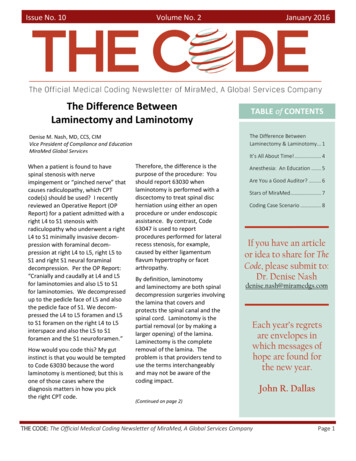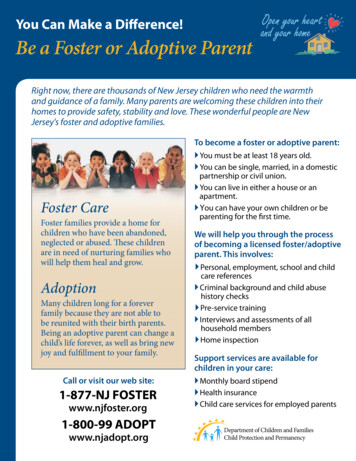
Transcription
You Can Make a Difference!Be a Foster or Adoptive ParentOpen your heartand your homeRight now, there are thousands of New Jersey children who need the warmthand guidance of a family. Many parents are welcoming these children into theirhomes to provide safety, stability and love. These wonderful people are NewJersey's foster and adoptive families.To become a foster or adoptive parent: You must be at least 18 years old. You can be single, married, in a domesticFoster CareFoster families provide a home forchildren who have been abandoned,neglected or abused. These childrenare in need of nurturing families whowill help them heal and grow.AdoptionMany children long for a foreverfamily because they are not able tobe reunited with their birth parents.Being an adoptive parent can change achild’s life forever, as well as bring newjoy and fulfillment to your family.Call or visit our web site:1-877-NJ FOSTERwww.njfoster.org1-800-99 ADOPTwww.njadopt.orgpartnership or civil union. You can live in either a house or anapartment. You can have your own children or beparenting for the first time.We will help you through the processof becoming a licensed foster/adoptiveparent. This involves: Personal, employment, school and childcare references Criminal background and child abusehistory checks Pre-service training Interviews and assessments of allhousehold members Home inspectionSupport services are available forchildren in your care: Monthly board stipend Health insurance Child care services for employed parentsDepartment of Children and FamiliesChild Protection and Permanency
Frequently Asked QuestionsWho are the children who need a foster family?Families are needed for all children but especially siblingsand children with special medical needs.Is a single person able to be a foster parent?Yes. Foster parents can be single, married in a domesticpartnership or a civil union. The important thing is theirwillingness and ability to parent.Is a foster parent able to hold a job?Yes. Foster parents are able to be employed outside thehome. In fact, CP&P may provide child care for your fosterchildren while you are at work.How many foster children may I have?This is determined for each family during the licensingprocess. However, foster homes are not approved for morethan four foster children.What does the licensing process consist of?What happens when the child returns home?A foster child’s return home is generally a planned activity,allowing the foster parent the opportunity to participate in theplanning and to say good-bye to the foster child. This canbe a difficult time, but the child’s return home represents asuccess. Returning home is the goal for most children infoster care.Are there board rates for foster care?Yes. A board payment is made to assist a foster family inproviding food, shelter, transportation and entertainment for afoster child. A clothing allowance is added to the board rate.Monthly board rates vary, depending on the age of the child.These rates may be higher if you are expected to spendadditional time caring for the child as a result of extraordinaryemotional or physical needs. The foster child’s caseworkerwill evaluate this with you and determine whether you areeligible for higher board rates.The licensing process includes nine training sessions; a homeevaluation; reference checks (medical, employment, personal,school); criminal history checks (including fingerprinting andlocal police checks); and a life safety home inspection. Thelicensing process usually is completed within five months.When will I receive a board check?Once a child is placed with me, how long will he/she stay?How are the costs of the child’s health care paid?Foster care is considered temporary. A foster child may staya few days or several months, depending on the child’s familysituation. If reunification efforts are not successful, fosterparents are encouraged to adopt.Board payments are made on a monthly basis, no later thanten working days after the end of the month, i.e., the boardcheck for January would be issued no later than the tenthworking day of February.Foster children are covered by Medicaid, which covers allnecessary care and treatment.Department of Children and FamiliesChild Protection and Permanency
Support for FamiliesFoster/Relative CareWhile a child is placed in your home, you will receive amonthly board payment, a clothing allowance and healthcare coverage for the child. In addition, you may be eligiblefor one or more of the following supportive services: Child care services while attending foster parent trainingor working Reimbursement for special transportation needs Infant care, car seats and/or bicycle helmets Flex funds to meet a child’s special needs (tutoring,camps, special activities, etc.) Special home rehabilitation funds through the Departmentof Community AffairsOrganizations such as Foster and Adoptive Family Services(FAFS) and their local county branches also can provideencouragement and assistance.Adoption Medicaid coverage for the child to assist with any physicalor psychological condition that is not covered by thefamily’s own insurance Children with disabilities may be able to receive specialservices for a specific medical, health or equipment need,which is approved on a case-by-case basis Out-of-state medical coverage (for most states) A federal tax credit the year the adoption takes placePreschool child care services may be available forsubsidy eligible children. Child care services are fundedby the Department of Human Services, Division of FamilyDevelopment (while funds are available), for adoptive parentswho work or attend school full-time.Parents receive the full subsidy until the child turns 18 or untilthe child completes high school or other equivalent program,whichever is later. Such payments may not exceed the costof providing comparable assistance in foster care. After thechild turns 21, other state services may be available.Most of the children adopted through CP&P have specialneeds. Adoption subsidy benefits are available to help theiradoptive parent by providing: A regular monthly payment including clothing allowance tohelp parents meet everyday need A one-time payment that covers the legal fees related toadoptionDepartment of Children and FamiliesChild Protection and Permanency
Licensing InformationWhether you are applying to become a foster or adoptiveparent or are a relative caring for a child, you are required tobecome a licensed resource family. The licensing processusually is completed within five months. This includes aHome Study Assessment Packet completed by CP&P/contract agency that consists of: A completed Resource Family application for all adulthousehold members Child abuse record information background checks for alladult household members Comprehensive psychosocial evaluation Reference checks (personal, medical, employment,school/child care center) for all for members in thehousehold Pre-service training for resource family applicants Life-safety inspectionOnce your home study assessment packet is completedby CP&P/contract agency, it is forwarded to the Office ofLicensing (OOL). The OOL will contact you to arrange foran inspection of your home. The home inspection includes: Interviews with household members Review of required documentation Life-safety inspectionReview of required documentationFor each child in placement, various records about the childshould be kept in the home. This would include documentationabout the child’s identifying information, medication log,health insurance, school information, and medical and dentalexaminations.For the resource parent, a review of insurance informationand driver’s license, if applicable, is required.Life-safety inspectionThe OOL inspector will need to look at each room in thehouse to make assessments regarding general maintenance,emergency evacuation, fire prevention, pet requirements,firearms and weapons, medication, personal care andhygiene, environmental sanitation and vehicle safety.Bedroom inspections include measurements to determinecapacity, ensuring that there are two means of exit, anassessment of space and ventilation, bedding requirementsand privacy. The licensing cycle is for three years; however,inspections are conducted annually. Inspections also occurto ensure any violations to the regulations are corrected andto conduct other types of inspections (e.g., a family relocatedto another home in the state, a complaint inspection or toincrease a home’s capacity).Interviews with household membersThe OOL inspector will conduct an in-depth interview witheach resource family parent and child in placement, ifapplicable. The interview will include questions regardingchildren’s rights, children’s records, training, supervision ofchildren, visitation, education, recreation, religion, food andnutrition, discipline, health care and treatment and clothingissues. In addition, each member of the household (adultsand children) may be interviewed in order to assess theirperception of becoming a resource family home and/or theirrelationship with the child in placement.Department of Children and FamiliesChild Protection and Permanency
Training (PRIDE)Right now, there are thousands of New Jersey children who need the warmth and guidanceof a family. Many parents are welcoming these children into their homes to provide safety,stabilityand love.These wonderfulJersey’s foster and adoptive families.Whether youare applyingto becomea foster or peopleadoptiveare NewPre-ServiceTrainingparent or are a relative caring for a child, you are requiredAll potential Resource Families complete PRIDE Preto attend trainingto become a licensed resource parent.FosterCareService ortraining.The PRIDEPre-service is a program forbecomeadoptiveparent:This training is called PRIDE – Parent ToResourcesfor a fosterrecruiting, preparing, assessing and selecting prospectiveFoster families provide a homeat least 18 years old.Information, Development and Education. You must befosterand adoptive families. The PRIDE program isfor children who have been You can be single,domesticpartnershipdesigned married,to strengtheninthea qualityof familyfoster care andabandoned, neglected or abused.PRIDE has three major training components:orcivilunion.adoption services by providing a standardized, consistent,These children are in need of You can livestructuredin eithera houseorcompetency-basedan apartment.recruitment, Foster PRIDE/AdoptPRIDETrainingframeworkfor thenurturingfamilies whowill Pre-servicehelppreparation,and childrenselection oforfosteradoptive parents.themhealand Coregrow.Training You can haveyour ownbe andparentingfor gratedthe first time. Foster PRIDE Advanced and Specialized Trainingapproach to recruitment, family assessment, and pre-serviceAdoptiontraining.Through thea seriesof at-homeconsultations andWewill help youthroughprocessof becomingaTrainingsarelongall designedto teachknowledgeManychildrenfor a efamilieslicensed foster/adoptive parent. This involves:and skillsin fivefamilybecausetheyessentialare not competencyhave an opportunity to learn and practice the knowledge andableto be reunited with theircategories: Personal, employment,schoolcare parents.referencesskills they will needas new andfoster childand adoptiveThebirth parents. Being an adoptive Criminal backgroundand childabusehistorychecks Protecting and nurturing edintheparent can change a child’s lifeof their ability and willingness to meet the essential Pre-service contexttraining Meetingaschildren’sdevelopmentalforever,well as bringnew joy needs, andcompetencies. Interviews and assessments of all household to your family. Home Supporting relationships between children andtheir inspectionfamiliesThis training is offered in nineSupport servicesare availableforwhichchildrenin your care: Connecting children to safe, nurturing relationshipsthree-hoursessionsinclude: Monthly board stipendintended to last a lifetime1. Connecting with PRIDE Working as a member of a professional team Health insurance2. Teamwork Towards Permanency Child care services for employed parents3. Meeting Developmental Needs: AttachmentIntegral to all three components is the belief that protecting4. Meeting Developmental Needs: Lossand nurturing children at risk and strengthening all theirfamilies (birth, foster, or adoptive) requires teamwork among5. Strengthening Family Relationshipsindividuals with diverse knowledge and skills, but all working6. Meeting Developmental Needs: Disciplinefrom a shared vision and toward a common goal. Foster and7. Continuing Family Relationshipsadoptive parents are essential members of this team. They,8. Planning for Changelike caseworkers, require preparation and training to acquire9. Making an Informed Decision: Taking PRIDEthe knowledge and skills they need to be effective membersof the professional team.1-877-NJ FOSTERwww.njfoster.org1-800-99 ADOPTDepartmentof Children and Familieswww.njadopt.orgDepartment of Children and FamiliesDivision of Youth and Family ServicesProtection and Permanency
You Can Make a Difference! Be a Foster or Adoptive Parent Foster Care Foster families provide a home for children who have been abandoned, neglected or abused. These children are in need of nurturing families who will help them heal and grow. To become a foster or adoptive pa
